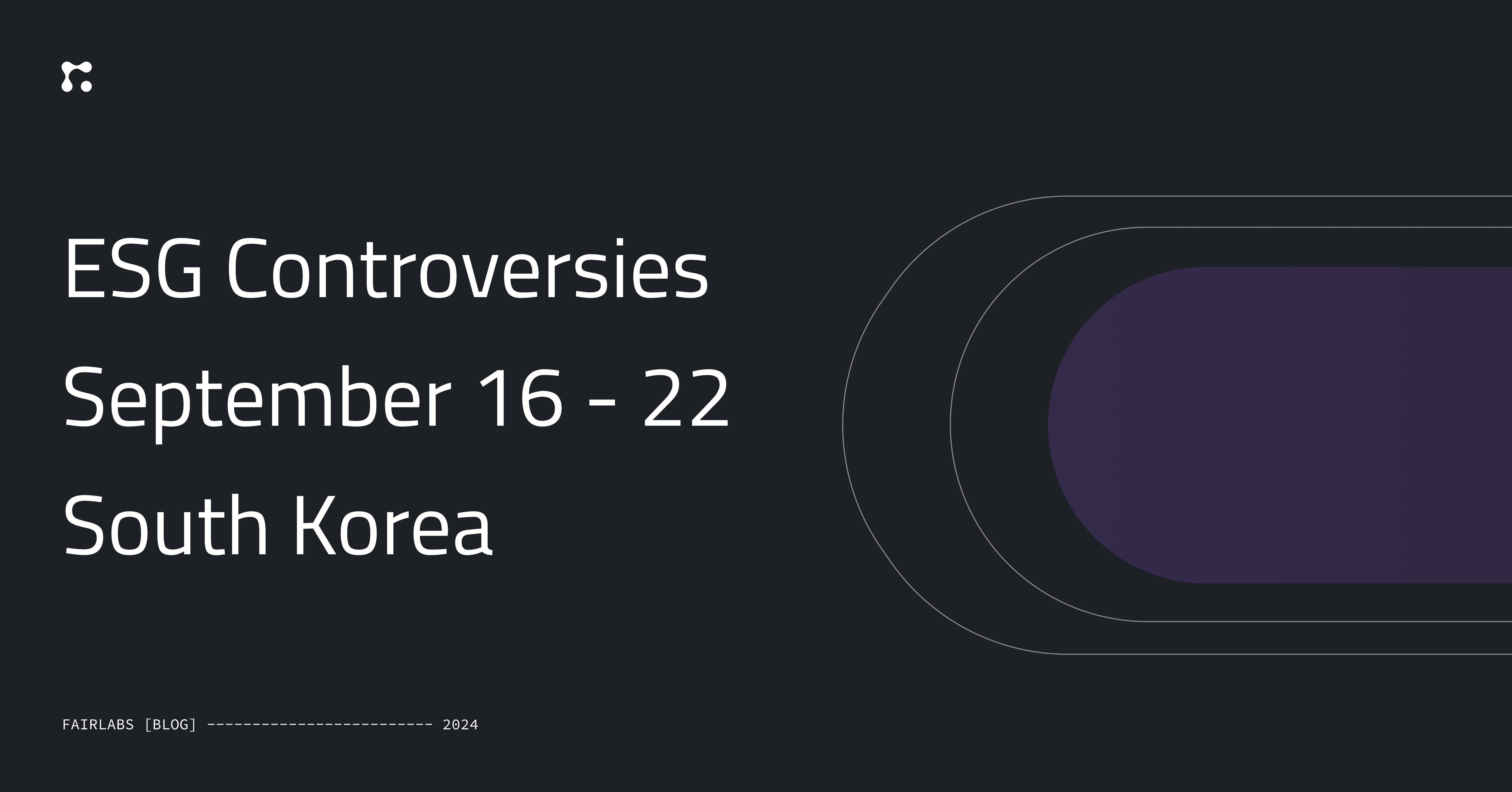
FairLabs Team
Apr 29, 2024
Weekly ESG Risk Spotlight (April 22~28)
Key takeaways
HYBE Dominates Weekly Controversy: The intense dispute over the management rights and accusations of breach of trust between HYBE and Ador's CEO Min Hee-jin emerged as the most significant issue this week, resulting in the 'Competitive Behavior' risk category soaring from 5.87% to 38.64% compared to the previous week.
Persistence of Business Ethics and Labor Practices Concerns: Business Ethics and Labor Practices remain critical areas of concern. Notably, DA Technology, SBW, and Samsung Electronics have been consistently identified as companies facing significant challenges in these risk categories, including legal trials and labor disputes.
Newly Emerged Issue in Labor Practices: In a landmark decision, the Supreme Court adjusted the monthly working days standard for urban daily workers from 22 to 20 days which serves as a basis for calculating industrial accident compensation.
Concerns Surrounding Systemic Risk Management: The update on systemic risk management hones in on the financial sector's woes, notably KB Financial Group and Hana Financial Group experiencing financial strain. This is primarily attributed to Hong Kong ELS compensation costs and the ripple effects of increased loan delinquency rates and foreign exchange losses.
Persistent Recall Challenges for Hyundai Motor and KIA: Hyundai Motor and KIA continue to grapple with issues related to vehicle recalls, underscoring ongoing concerns regarding product quality and safety in the automotive sector.

Competitive Behavior (38.64%)
The insights garnered from this week's developments in the ESG sphere highlight several systemic issues and emerging challenges across various sectors. The dramatic escalation in the 'Competitive Behavior' risk, as evidenced by the HYBE and Ador controversy, underscores the volatility and potential disruptions in corporate governance that can reverberate through the entertainment industry. This instance serves as a stark reminder of the importance of robust management practices and transparent stakeholder communications.

2. Business Ethics (13.66%)
Simultaneously, the persistent ethical and labor practice concerns, particularly within major corporations like DA Technology, SBW, and Samsung Electronics, suggest a deeper, more systemic problem in adhering to ethical standards and labor laws. These ongoing issues, coupled with legal and labor disputes, emphasize the need for stronger enforcement of regulations and a commitment to ethical practices as core components of corporate strategy.

3. Labor Practices (8.18%)
Furthermore, the Supreme Court's adjustment in the working days standard for day laborer represents a significant step towards fair labor practices. This adjustment not only impacts compensation calculations but also sets a precedent for reassessing labor rights in light of contemporary work realities, potentially prompting a reevaluation of labor standards across industries.

4. Systemic Risk Management (6.58%)
The financial sector's struggle with systemic risk management, highlighted by the tribulations of KB Financial Group and Hana Financial Group, points to vulnerabilities within financial institutions. These challenges, compounded by external economic pressures such as loan delinquencies and currency fluctuations, call for enhanced risk assessment frameworks and adaptive management strategies to mitigate potential crises.

5. Product Quality & Safety (5.02%)
Lastly, the ongoing recall issues faced by Hyundai Motor and KIA illustrate the critical need for continuous improvement in product quality and safety measures in the automotive industry. These recalls not only affect consumer trust but also reflect on the industry's ability to maintain high standards of manufacturing and quality control.

In conclusion, this week's ESG concerns reflect a broader call for businesses to integrate ethical practices, robust governance, and proactive risk management into their core operations. Companies are increasingly held accountable not just for financial performance, but also for their impact on social and governance realms. This evolving landscape requires a concerted effort from all corporate stakeholders to foster transparency, sustainability, and resilience in their business models.
Disclaimer: The information contained in this article is not investment advice. FairLabs does not endorse or recommend any investments and assumes no liability for any consequence relating directly or indirectly to any action or inaction taken based on the information contained in this article.
Reproduction and use rights are strictly limited to personal non-commercial use. Any other use is not permitted without written consent. Please contact us for further details at team@fairlabs.io.
All rights reserved. © FairLabs 2024
Latest Posts



